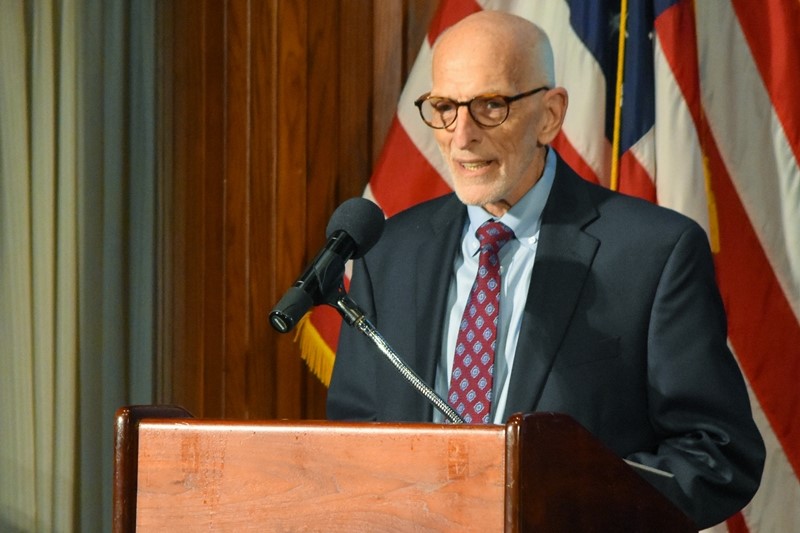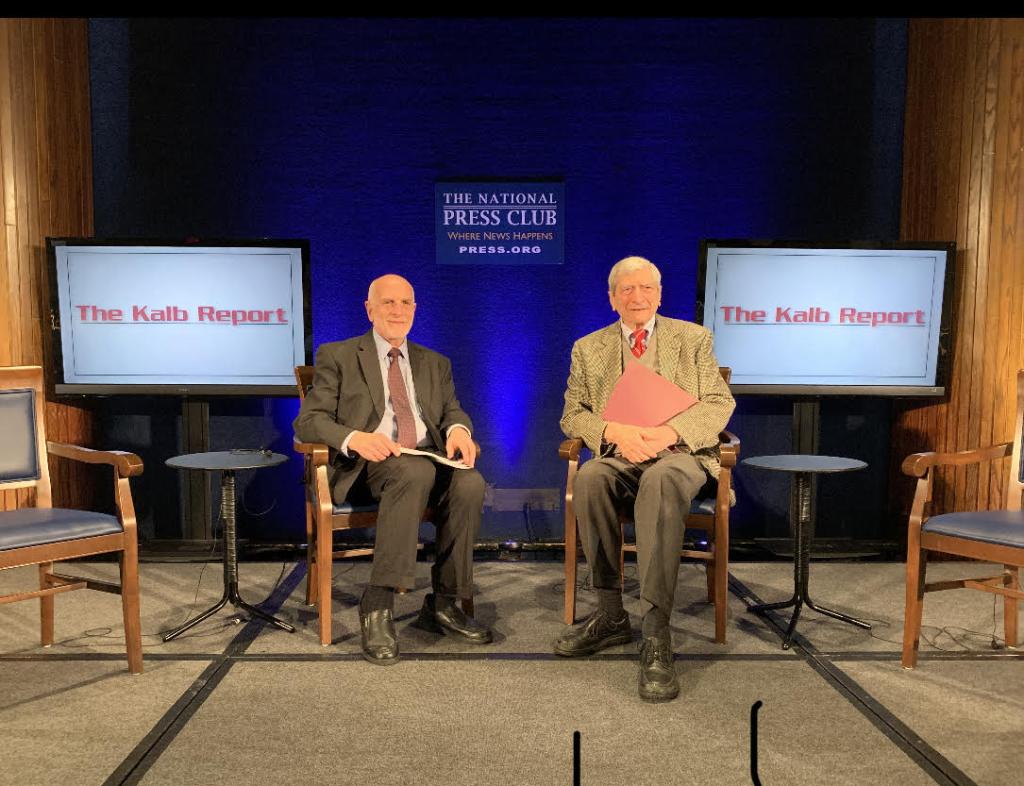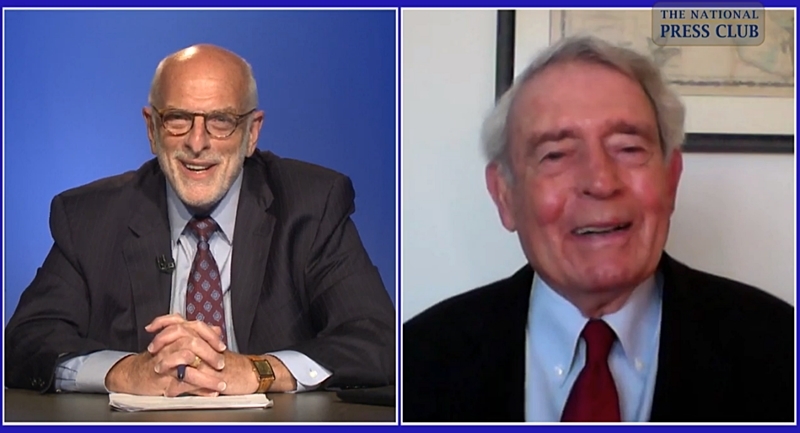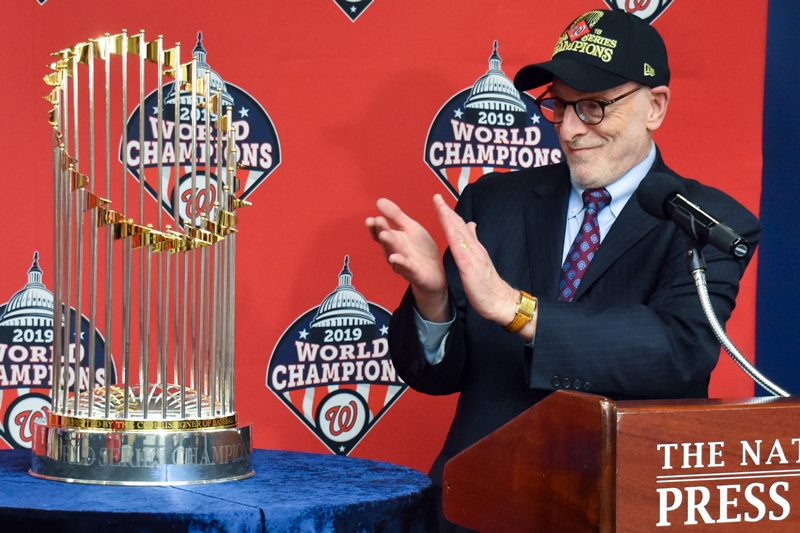Freedman led Club through Covid, created 'The Kalb Report'
Michael Freedman, who led the National Press Club during the tumultuous opening months of the Covid pandemic and who for 28 years was the driving force and executive producer of the Club’s "The Kalb Report," died Sept. 18. He was 71.
The cause was pancreatic cancer, which he had been battling for more than a year.

Even after being diagnosed with cancer, Freedman maintained his work with the Club. During the reception to mark the end of the 28-year-run of "The Kalb Report" with 103 programs on April 22, which Freedman had organized, Club President Eileen O’Reilly presented him with the John Cosgrove Award, given to past presidents who keep serving the Club.
While O'Reilly lauded Freedman for all he had done while president and since, she said that even more important, “you served as an essential mentor, advisor and friend to the three Club presidents who succeeded you – Lisa Matthews, Jen Judson and myself – as well as to (Club Executive Director) Bill McCarren and the Club staff.”
As one of the last things he accomplished for the Club, he worked with Beth Francesco, executive director of the Club’s Journalism Institute, to secure a $25,000 grant from the Inasmuch Foundation to produce a series of programs on journalism ethics called “Why Murrow Matters” that will begin this fall.

At the time of his passing, Freedman was Journalist in Residence and senior vice president of the University of Maryland Global Campus. At the same time, he had been teaching journalism history at the George Washington University, bringing his students weekly to the Club.
Freedman was born on April 29, 1952, in Detroit. His father died when he was six years old. As a gift, he got a small transistor radio, which he said he kept under his pillow listening to the Detroit Tigers games. As a result, he said he developed a lifelong passion for baseball and for radio. One of the highlights of his term, he said, was getting the Washington Nationals to lend the Club its 2019 World Series trophy.
Creation of The Kalb Report
His work with GW, both as a professor and an administrator, brought him to the National Press Club in 1994 with Marvin Kalb, a former CBS News correspondent. They proposed to do a series of programs in partnership with the Club to examine the junction of journalism and democracy that became known as “The Kalb Report.”

When the series ended after the first year, Freedman pushed to keep it alive, finding financial backers and putting together a network of public broadcasting stations as well as radio outlets that made the series the marquee of the Club’s professional forums.
“Mike Freedman represented the highest standards of American journalism,” Kalb said. “He was a model for young journalists. Whenever I needed help on an issue regarding American journalism, I turned to Mike. He was one of the most honorable, decent human beings I have ever met.”
As a devotee of radio news history, he became a close friend of Edward R. Murrow’s son, Casey. He enticed Casey to donate artifacts of the legendary Murrow to the Club and to lend the microphone that Murrow used to broadcast from London during World War II. Freedman called it “the Holy Grail” of broadcast journalism. When Casey wanted to sell it, Mike purchased it and lent it to the Club.
Leading the Club through Covid
Just three months into his term of office, Covid forced the Club to close for in-person activities. Freedman used all of his skills as a broadcast journalist, educator and high-level administrator to work with McCarren to create online events that maintained the Club’s public image.
At the same time, he and McCarren had to deal with the daunting work of reducing Club staff, applying for federal relief programs and doing everything they could to support staff members and their families through the emergency.
Coupled with the challenges of the pandemic were protests in Lafayette Square that threatened the Press Building, the presidential campaign, the failed Trump insurrection, the presidential inaugural and the launch of vaccinations. The Club not only provided journalists with work space when their newsrooms were closed, but kept up with its mission of speaking out on behalf of global press freedom.
“Mike Freedman was essential to the survival of the Club during the opening months of the pandemic,” McCarren said. “His commitment to the Club was unshakable, and his management and communications skills allowed us to pivot quickly to keep Club programs alive on Zoom. He was often the only member in the Club.”
One of Freedman’s passion projects was producing Marty Bufalini’s “It’s a Wonderful Life: The Radio Show,” an adaptation of the classic story that featured 19 Club members playing 43 roles in the 63-page script. The Club first produced the play during the Holiday Season in 2020. It was re-recorded in 2021 and aired that year and again in 2022. The production was offered by the CBS Radio Network to its 600-plus affiliates nationwide and was featured on the American Heritage website.
Launching his career
A graduate of Wayne State University, Freedman began his journalism career in Detroit radio for 15 years as a multiple award-winning reporter, anchor, sportscaster and news director. He moved to Washington in 1985 to be managing editor of UPI’s Broadcast Division. He and his team earned more than 85 honors, including 14 Edward R. Murrow awards. He was the co-author of The Broadcast Voice Handbook and a contributing author to Broadcasting Through Crisis, Responsible Journalism and The Encyclopedia of Journalism.

While working as an administrator and professor at George Washington University, Freedman forged partnerships with CNN, Politico, and the Newseum, as well as the Press Club, while he led the university’s production of more than 700 CNN Crossfire telecasts live from the campus.
As general manager of the CBS Radio Network, Freedman partnered with Walter Cronkite on a 30-part radio series, “Walter Cronkite Postscripts to the 20th Century.” He was executive producer of the three-hour CBS News 20th Century Roundup, anchored by Dan Rather and featuring the final reunion of all the surviving members of Edward R. Murrow’s original WWII broadcast team.
Freedman’s last position was as senior vice president and Journalist in Residence at the University of Maryland Global Campus where he built the university’s global communications operation and served as executive producer of the award-winning public broadcasting documentary “Over There,” chronicling the pioneering overseas faculty who taught in the war zones of Vietnam, Iraq and Afghanistan.

Freedman is survived by his wife, Renee, two sons, Brian, and Club member Danny, a freelance writer, and five grandchildren.
Jean Folkerts, a former George Washington University administrator who worked closely with Freedman, once summed him up this way: Mike Freedman is the only person I know who can come up with a good idea and make it happen.
